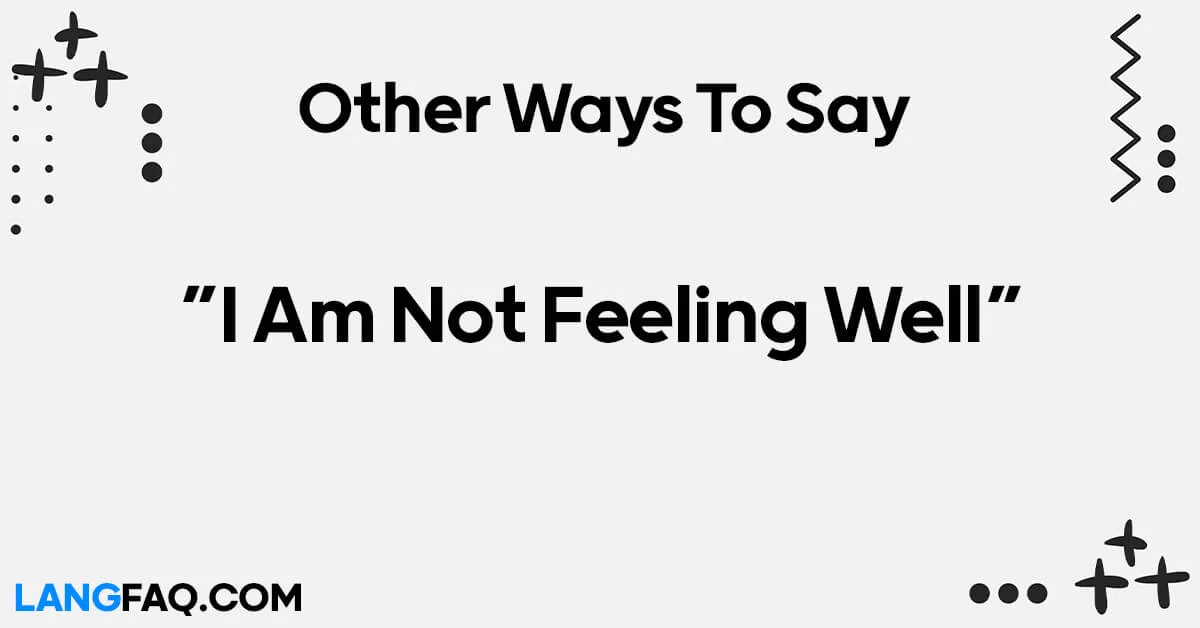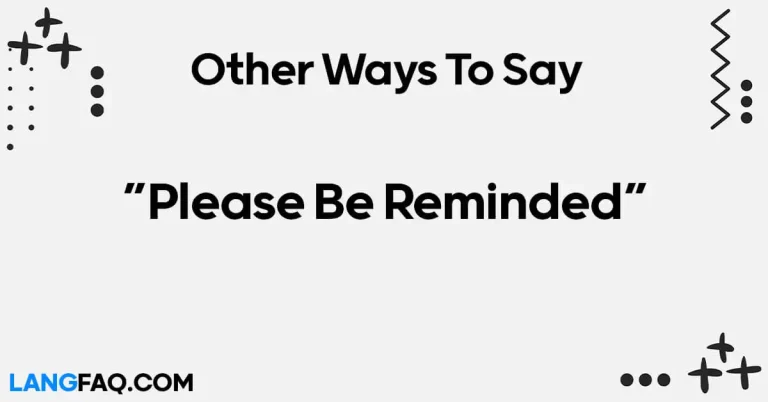In the realm of professional communication, expressing not feeling well via email requires finesse and variety. This article delves into 12 alternative ways to convey this message effectively. Enhance your email communication skills and navigate workplace interactions with ease.
12 Other Ways to Say “I Am Not Feeling Well” in an Email
Here are 12 alternative ways to express “I am not feeling well” in an email, presented in a more narrative format:
- Experiencing Discomfort: Today hasn’t been the best day for me health-wise. I’m currently experiencing some discomfort.
- Health Isn’t Optimal: I wanted to give you a heads up that my health isn’t at its optimal state today.
- Facing Physical Strain: Unfortunately, I’m facing some physical strain at the moment.
- Not in Peak Condition: Regrettably, I must inform you that I’m not in peak condition today.
- Dealing with Wellness Challenges: I hope this message finds you well. Currently, I’m dealing with a few wellness challenges.
- Suffering a Setback: I’ve encountered a setback and, as a result, not feeling my best.
- Health is Subpar: It’s not the best news, but my health is a bit subpar today.
- Weathering Health Issues: Just a quick note to mention that I’m currently weathering through some unexpected health issues.
- Enduring Physical Discomfort: Today, I find myself enduring a bout of physical discomfort.
- Encountering Wellness Hurdles: I thought it best to inform you that I’m encountering some wellness hurdles.
- Undergoing a Wellness Challenge: Presently, I’m undergoing a bit of a wellness challenge.
- Feeling a Bit Under the Weather: My apologies, but I’m feeling a bit under the weather today.
Here’s a table with meanings and examples for each alternative expression:
| Expression | Meaning | Example |
|---|---|---|
| Experiencing Discomfort | Currently feeling uneasy or unwell. | Example: Today hasn’t been the best day for me health-wise. I’m experiencing some discomfort. |
| Health Isn’t Optimal | Not at the best state of health. | Example: I wanted to give you a heads up that my health isn’t at its optimal state today. |
| Facing Physical Strain | Dealing with physical stress or strain. | Example: Unfortunately, I’m facing some physical strain at the moment. |
| Not in Peak Condition | Not in the best physical state. | Example: Regrettably, I must inform you that I’m not in peak condition today. |
| Dealing with Wellness Challenges | Coping with various health challenges. | Example: I hope this message finds you well. Currently, I’m dealing with a few wellness challenges. |
| Suffering a Setback | Facing a setback affecting well-being. | Example: I’ve encountered a setback and, as a result, not feeling my best. |
| Health is Subpar | Health is below the usual standard. | Example: It’s not the best news, but my health is a bit subpar today. |
| Weathering Health Issues | Going through unexpected health problems. | Example: Just a quick note to mention that I’m currently weathering through some unexpected health issues. |
| Enduring Physical Discomfort | Going through a period of physical discomfort. | Example: Today, I find myself enduring a bout of physical discomfort. |
| Encountering Wellness Hurdles | Facing obstacles in maintaining wellness. | Example: I thought it best to inform you that I’m encountering some wellness hurdles. |
| Undergoing a Wellness Challenge | Going through a specific health challenge. | Example: Presently, I’m undergoing a bit of a wellness challenge. |
| Feeling a Bit Under the Weather | Slightly unwell or not in the best condition. | Example: My apologies, but I’m feeling a bit under the weather today. |
This table provides a diverse range of expressions to convey the message of not feeling well in an email. Whether facing physical discomfort, wellness challenges, or setbacks, these alternatives offer a nuanced and varied vocabulary for effectively communicating your state of health. Tailor your choice based on the context and tone desired, ensuring your message is both clear and considerate in professional communication.
Is It Correct to Say “I Am Not Feeling Well”?
Yes, the phrase “I am not feeling well” is grammatically correct and commonly used to convey a state of unwellness or discomfort. It is a straightforward and clear way to express that you are not in good health.
When to Use:
- Formal Situations:
- In professional emails to inform colleagues or superiors about your health status.
- When communicating with clients or stakeholders to explain any potential delays or changes in plans.
- Informal Situations:
- When talking to friends or family about your health.
- In casual conversations to explain any limitations or adjustments needed.
Variations:
While “I am not feeling well” is a widely accepted and appropriate expression, you can also use alternative phrases based on the level of formality or the specific context. For instance:
- More Formal:
- I am currently experiencing some discomfort.
- My health is not at its optimal state.
- Neutral:
- I’m facing some physical strain.
- Not in peak condition.
- Casual:
- Feeling a bit under the weather.
- Suffering a setback.
Professional Mail Example With “I Am Not Feeling Well”
Subject: Temporary Absence – Not Feeling Well
Dear [Recipient’s Name],
I trust this email finds you well. I am writing to inform you that unfortunately, I am not feeling well today and, as a result, I will not be able to attend work.
I understand the importance of my responsibilities and the impact of my absence on the team. To ensure a smooth workflow during my temporary absence, I have already informed [colleague’s name] about the current status of my projects. I have also documented the progress and any pending tasks that may require attention.
I will be in touch with [colleague’s name] throughout the day to provide any additional information or clarification needed. If there are any urgent matters that require my immediate attention, please do not hesitate to contact me via email or phone.
I have also notified [HR’s name] about my situation, and I will follow the necessary procedures to formally request sick leave for the day.
I apologize for any inconvenience my absence may cause and appreciate your understanding in this matter. I am committed to ensuring a smooth transition during my temporary absence and will do my best to resume work as soon as I am back in good health.
Thank you for your consideration.
Best regards,
[Your Full Name] [Your Position] [Your Contact Information]
Experiencing Discomfort: Navigating the Art of Tactful Disclosure
Expressing not feeling well is an art, and using the phrase “Experiencing Discomfort” can add a touch of formality to your disclosure. This phrase is versatile, suitable for both professional and personal contexts.
When to Use:
- Professional Context: In emails to colleagues or superiors.
- Informal Context: Among friends or acquaintances.
Example Sentence:
Dear [Colleague’s Name],
I hope this message finds you well. I wanted to let you know that I am currently experiencing some discomfort and might need a bit of flexibility in my schedule this week. I appreciate your understanding.
Variations:
- Experiencing Unease
- Undergoing Physical Discomfort
Health Isn’t Optimal: Crafting a Professional Discourse
When you need to communicate your less-than-optimal health status formally, “Health Isn’t Optimal” offers a polished alternative. This phrase maintains a level of professionalism while conveying your situation clearly.
When to Use:
- Professional Context: In emails to supervisors or clients.
- Informal Context: In more formal settings with friends or family.
Example Sentence:
Dear [Supervisor’s Name],
I hope this email finds you well. I wanted to inform you that my health isn’t optimal today, and I might need to take a short sick leave. I’ll ensure that all pending tasks are covered during my absence.
Variations:
- Well-Being Not at Its Best
- Currently Not Feeling My Best
Facing Physical Strain: Communicating with Transparency
“Facing Physical Strain” communicates a more transparent aspect of your well-being. This phrase suits scenarios where you want to express that you’re dealing with physical stress or strain.
When to Use:
- Professional Context: In a mentor-mentee relationship to convey challenges.
- Informal Context: Among close colleagues or friends.
Example Sentence: Hi [Mentee’s Name],
I wanted to share that I’m currently facing some physical strain due to a recent health concern. If you have any questions or need adjustments in our schedule, feel free to let me know.
Variations:
- Dealing with Physical Stress
- Undergoing Physical Challenges
Not in Peak Condition: Balancing Formality and Clarity
When professionalism is key, saying “Not in Peak Condition” strikes a balance between formality and clarity. It’s a versatile choice suitable for various workplace scenarios.
When to Use:
- Professional Context: In team emails or official correspondence.
- Informal Context: When communicating with professional acquaintances.
Example Sentence:
Dear Team,
I wanted to inform you that I’m not in peak condition today. However, I’ll do my best to meet the deadlines and contribute to our ongoing projects. Thank you for your understanding.
Variations:
- Not Operating at Full Capacity
- Health Not at Its Pinnacle
Dealing with Wellness Challenges: Striking a Balance in Communication
“Dealing with Wellness Challenges” delicately conveys the presence of ongoing health issues without delving into specifics. It’s suitable for both formal and informal settings, offering a considerate tone.
When to Use:
- Professional Context: In emails to HR or colleagues when requesting accommodations.
- Informal Context: When sharing personal challenges with friends.
Example Sentence:
Hi [HR’s Name],
I hope this message finds you well. I wanted to discuss some wellness challenges I’ve been facing lately and explore potential accommodations or adjustments. Your guidance in this matter would be highly appreciated.
Variations:
- Navigating Health Hurdles
- Coping with Health Challenges
Suffering a Setback: Conveying Resilience Amidst Adversity
“Suffering a Setback” subtly communicates that you’re facing challenges affecting your well-being. This phrase adds an element of resilience to your message, suitable for various contexts.
When to Use:
- Professional Context: In emails to supervisors or colleagues, sharing challenges impacting your work.
- Informal Context: When informing friends or family about personal struggles.
Example Sentence:
Dear [Supervisor’s Name],
I hope this email finds you well. I wanted to be transparent about the fact that I’m currently suffering a setback, and it might influence my work temporarily. I’m committed to overcoming this challenge and appreciate your support.
Variations:
- Encountering Temporary Challenges
- Facing a Minor Setback
Health is Subpar: A Subtle yet Formal Disclosure
When you need to maintain a certain level of formality while expressing your health condition, “Health is Subpar” fits the bill. This phrase conveys a subtle message without being overly detailed.
When to Use:
- Professional Context: In emails to clients or stakeholders.
- Informal Context: When communicating with professional acquaintances.
Example Sentence:
Dear [Client’s Name],
I hope this email finds you in good health. I wanted to update you that my health is currently subpar, and I might need to reschedule our upcoming meeting. I appreciate your understanding.
Variations:
- Current Health Falls Below Standard
- In a Less Than Optimal State
Weathering Health Issues: Acknowledging and Addressing Unexpected Challenges
“Weathering Health Issues” paints a vivid picture of facing unforeseen health problems. This phrase is suitable for conveying the unexpected nature of your health concerns.
When to Use:
- Professional Context: In team communications to explain potential delays.
- Informal Context: Sharing personal challenges with friends.
Example Sentence:
Hi Team,
I hope this message finds you well. Unfortunately, I’m currently weathering through some unexpected health issues, which might affect my availability this week. I’ll keep you updated on my progress.
Variations:
- Navigating Unforeseen Health Problems
- Coping with Unexpected Health Challenges
Enduring Physical Discomfort: Balancing Professionalism and Casualness
“Enduring Physical Discomfort” strikes a balance between professionalism and casualness. It’s suitable for scenarios where you want to maintain a certain level of formality without sounding too clinical.
When to Use:
- Professional Context: In team emails or discussions about work constraints.
- Informal Context: Among close colleagues or friends.
Example Sentence:
Hey [Colleague’s Name],
Just a quick heads up—I’m currently enduring some physical discomfort. I might need a bit of flexibility with my tasks today. Thanks for your understanding.
Variations:
- Going Through Physical Unease
- Experiencing Physical Discomfort
Encountering Wellness Hurdles: Seeking Understanding in Professional Settings
“Encountering Wellness Hurdles” is a phrase that seeks understanding in professional settings. It conveys the notion of facing obstacles in maintaining wellness without going into specific details.
When to Use:
- Professional Context: In emails to supervisors or HR when discussing potential accommodations.
- Informal Context: When sharing personal challenges with professional acquaintances.
Example Sentence:
Dear [Supervisor’s Name],
I hope this email finds you well. I wanted to discuss the possibility of some accommodations due to the fact that I’m currently encountering wellness hurdles. Your guidance on this matter would be highly appreciated.
Variations:
- Navigating Health Obstacles
- Overcoming Wellness Challenges
Undergoing a Wellness Challenge: Acknowledging and Addressing Ongoing Struggles
“Undergoing a Wellness Challenge” is a phrase that acknowledges ongoing struggles without going into explicit details. It’s suitable for both formal and informal communication.
When to Use:
- Professional Context: In emails to colleagues when seeking understanding.
- Informal Context: Sharing personal challenges with friends.
Example Sentence:
Hi [Friend’s Name],
I hope you’re doing well. I just wanted to share that I’m currently undergoing a bit of a wellness challenge. Your support means a lot to me during this time.
Variations:
- Facing Ongoing Wellness Struggles
- Navigating Through a Wellness Challenge
Feeling a Bit Under the Weather: Infusing Casualness with Honesty
“Feeling a Bit Under the Weather” is a casual yet honest way to express not feeling well. It’s suitable for various contexts, adding a touch of informality without compromising clarity.
When to Use:
- Professional Context: In team communications or casual discussions.
- Informal Context: Among friends or close colleagues.
Example Sentence:
Hey Team,
Just a quick note to let you know I’m feeling a bit under the weather today. I’ll do my best to catch up on any missed tasks tomorrow. Thanks for your understanding.
Variations:
- Not Quite My Best Today
- Going Through a Rough Patch
Frequently Asked Questions
How to Politely Express Discomfort in Professional Emails?
In professional settings, it’s crucial to maintain politeness. Phrases like “Not at my best” or “A touch below par” convey your state without oversharing.
Is it Necessary to Specify the Ailment in Professional Communication?
Not always. Using phrases like “Feeling a bit off” or “In a bit of discomfort” allows you to communicate your condition without delving into specifics.
What’s the Balance Between Formality and Casualness in Expressing Discomfort?
Strike a balance based on your workplace culture. Phrases like “Not up to par” are formal, while “Slightly off my game” adds a casual touch.
Can I Use Humor to Express Discomfort in Emails?
Yes, cautiously. Phrases like “Feeling a tad poorly” inject humor without compromising professionalism.
How Often Can I Use Alternative Expressions for “Not Feeling Well”?
While variety is beneficial, use discretion. Reserve alternative expressions for genuine situations to maintain authenticity.
How to Convey Emotional Unease Professionally?
Choose phrases like “In low spirits” or “Could be better” to convey emotional unease professionally without oversharing.
Conclusion
Mastering the art of expressing not feeling well in emails is a valuable skill. These 12 alternative phrases provide a nuanced approach, allowing you to maintain professionalism while communicating effectively. Choose the expression that aligns with your style and workplace culture, ensuring your messages are both genuine and well-received.







